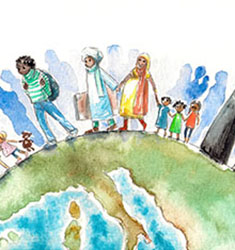Program Description
Anthropology is the study of humans and non-primates using comparative, evolutionary, and historical perspectives. Because we study all aspects of humans, anthropology is said to be holistic and inter-disciplinary, that is anthropologists work hand-in-hand with other sciences (such as biology, physiology, sociology and psychology), as well as the humanities (such as history, world languages & cultures, and religious studies).
At the University of Utah, the Anthropology Department is organized into four main divisions: Cultural, Biological, Evolutionary Ecology, and Archaeology. Cultural anthropology focuses on understanding the differences and similarities between groups of people over time, space, and scale - this includes how we think and behave, to how cultures evolved from the smallest family groups 200,000 years ago, to world's largest nation states today. Biological anthropology focuses on ancient and modern human anatomical, physiological, and biological variability. Biological anthropology also concerns itself with non-human primates like chimpanzees and gorillas—by studying them, we hope to learn more about ourselves. Archaeology is the excavation and interpretation of what humans leave behind in order to infer how and why humans have evolved. Evolutionary ecology (sometimes known as behavioral ecology) examines human (and non-human primate) behavior and life-history—why did human beings evolve the way they did?
Ultimately, anthropologists use all four sub-disciplines to describe and explain past and present human diversity. The Department takes a theoretically-driven, empirically-informed perspective focusing on the following specific areas of expertise: archaeology, genetics, behavioral ecology, cultural evolution, demography, paleoanthropology, hunter-gatherer behavior, and human and non-human primate behavior.
Because many faculty members’ research areas cross disciplinary and sub-disciplinary lines, students are encouraged to do the same. Whether you pursue the major or the minor, Anthropology is an excellent program for those desiring a better understanding of the human biological and cultural experience through time and space. Optional emphases allow students to specialize in certain areas within the Anthropology Major. Choose from:
The Student Experience
You can join the Anthropology Club to learn more about the field, meet like-minded students, and practice networking. Consider enriching your education with a study abroad program or field school: for example, students can travel to Tonga or Mexico for an immersive research experience or attend archaeology or primate field schools to gain hands-on skills. Undergraduate research projects are also excellent opportunities for students to pursue individual interest areas and gain valuable research and analytical skills.
Career Opportunities
Anthropology will prepare you for a wide array of careers. With additional schooling in the field of anthropology, coupled with the research and field work experience you gained in your undergraduate career, students can become researchers, archaeologists, or professors. A degree in anthropology can also prepare you for an advanced degree in business, medicine, or law. Graduates of the program may pursue work in museums as curators or archivists, enter the nonprofit sector as grant writers or program managers, or become employed by the government as surveyors, urban planners, or policy analysts.
More Info
- Department of Anthropology
- College of Social & Behavioral Science
- Department Advising
- U Career Success

 Anthropology
Anthropology


